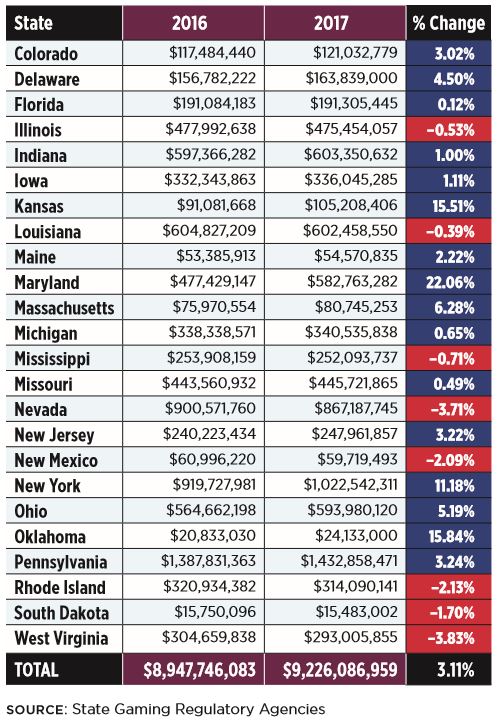If Virginia is going to sell its soul, we should at least get the market price.
The Virginia Racing Commission is starting to publish monthly reports on the cash flow to Colonial Downs and to the government under the new state-granted monopoly to operate gambling dens. Any relationship to horse racing in these establishments is just an elaborate ruse, although there is this interesting new word in the industry: Racinos.
The April, May and June reports, which you can find here, track the slow roll opening of the slot machine facilities in Vinton, Richmond and at the main racetrack site in New Kent County. Only the June report picks up some of the operation at the large facility just opened on Midlothian Turnpike in Richmond, the excitement captured by this Richmond Times-Dispatch account.

By the end of June, the three facilities had collected about $174.4 million from bettors, most of it in June. The real revenue pace won’t be visible until the Richmond operation has a full month and Hampton Roads joins in. State policy and industry practice dictate at least 92 percent of the betting revenue returns in prizes, leaving 8 percent for the casino operator and its government partner to divide. It’s the volume, the churn of winnings bet again, that generates the big bucks.
Virginia takes far less in taxes or fees than most of the other states who have made this deal with the devil, leaving Colonial Downs with potentially one of the highest profit rates in the country. State law sets the tax rate at 1.25 percent of the gross bets, or “handle”, leaving 6.75 percent to the operator. Of that, 60 percent is state (0.75 percent) and 40 percent local (0.50). That’s an effective tax rate of 16 percent.
The tax rate on the same machines in Maryland is between 50 and 62 percent. In Delaware it is 58 percent. In New York, 65 percent. In Florida, 35 percent. In West Virginia, try 53.5 percent. These figures come from a new document that Virginia state tax policy wonks need to add to their reading list, the American Gaming Association’s annual report.
It should be the first document examined by the Joint Legislative Audit and Review Commission as it studies Virginia’s full entry into this brave new world of financing government with casino gambling. The General Assembly has voted for it once, but with a re-enactment clause requiring a second approval. You won’t find this much financial detail in the fiscal impact statement on the bill.
JLARC also needs to look closely at the license fees charged in other states and compare that to the tiny $1,000 per location Colonial Downs is paying.
The low tax rate basically doubles or triples the value of the license Virginia has granted Colonial Downs, according to Jeffrey Hooke, an expert on this business who is also a lecturer at the Johns Hopkins University business school. Hooke said that he tried to reach out to Virginia legislators to ask them why they were being so generous to this monopoly business, but nobody called him back. He described this as “a terrible giveaway to extremely wealthy people.”
His quick estimate is that each of these machines generates $200 per day after prize payouts, and if operated 365 days, that’s $73,000 per year. After giving the state and locality their cut, and paying its operating costs, the operator may be keeping a full 50 percent in profit. The pre-tax profit on 3,000 such machines might be $110 million.
Virginia’s initial tax rate on these first three reports is a bit higher than 16 percent, because the operator did not hold the full 8 percent in those first three months. Virginia and the relevant localities divided $2.1 million. The state and local split on every $1 billion should be no less than $12.5 million. In most of those other states it would be $40-50 million. Virginia is leaving more than $30 million on the table for every $1 billion in bets.
A higher portion of the house’s share kept by government would not lower the winnings shared with players, Hooke said, adding that the data indicates the average player loses $70 per visit. Hooke reached out to the Thomas Jefferson Institute and Bacon’s Rebellion, not the other way around, and his first question was why would the General Assembly set such a ridiculously low value on its franchise?
Of course, the government skim is only part of the story, as these facilities will also generate real estate, sales and eventually state income taxes. Fully operational the facilities will have a substantial (if not very high paid) workforce, and as part of the deal Colonial Downs is also re-starting real horse race operations at its New Kent facility. The argument that absent this Virginians would just spend their money in another state is valid.
But shouldn’t Virginia at least take the same share as those other states would? Is this a tax or a franchise fee? In the case of the lottery, with its $2 billion plus in annual sales, all the “profits” benefit the government. All the profits on the wholesale liquor business flow to the government through the Alcoholic Beverage Control Board. Maybe Virginia wants to remain a low tax, casino-friendly venue, but at least make that decision fully aware of what the other states are taking off the table.
A version of this commentary originally ran in the July 11 edition of the online Bacon’s Rebellion.





